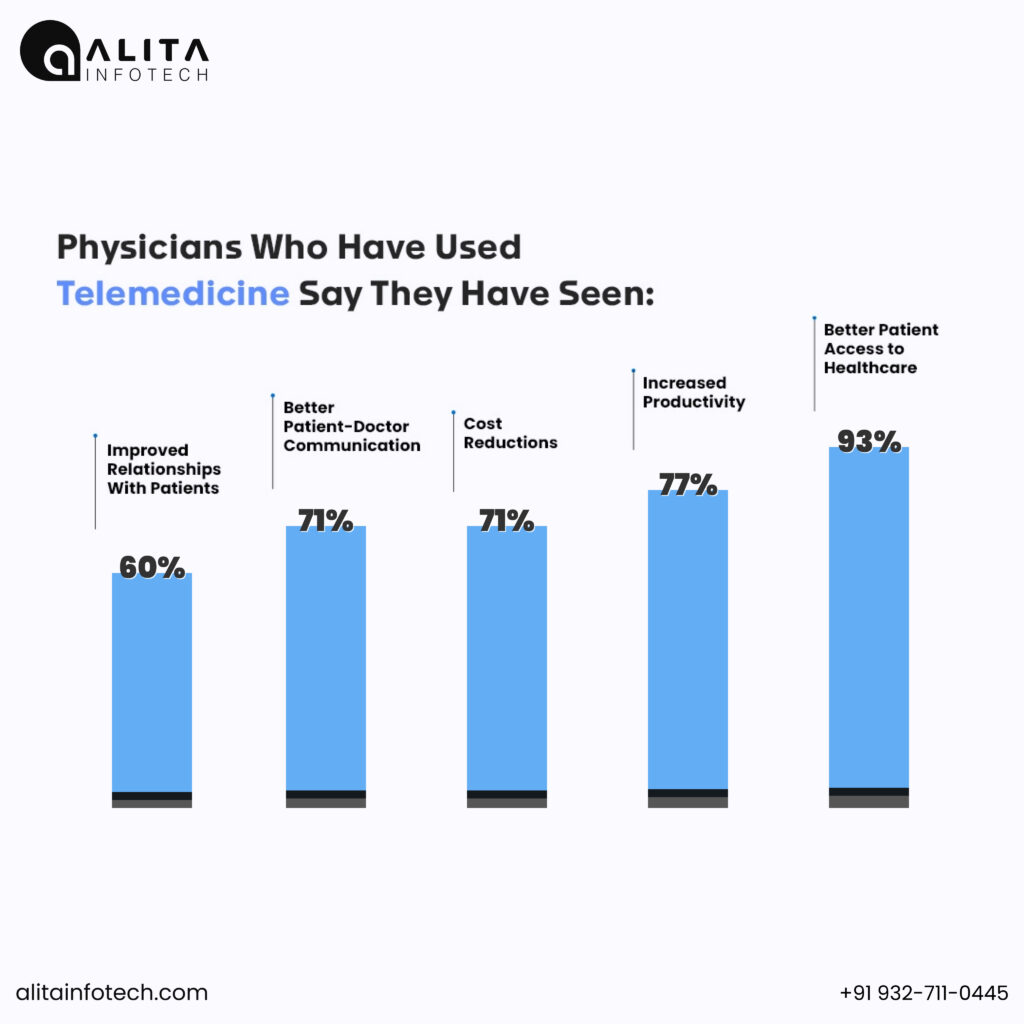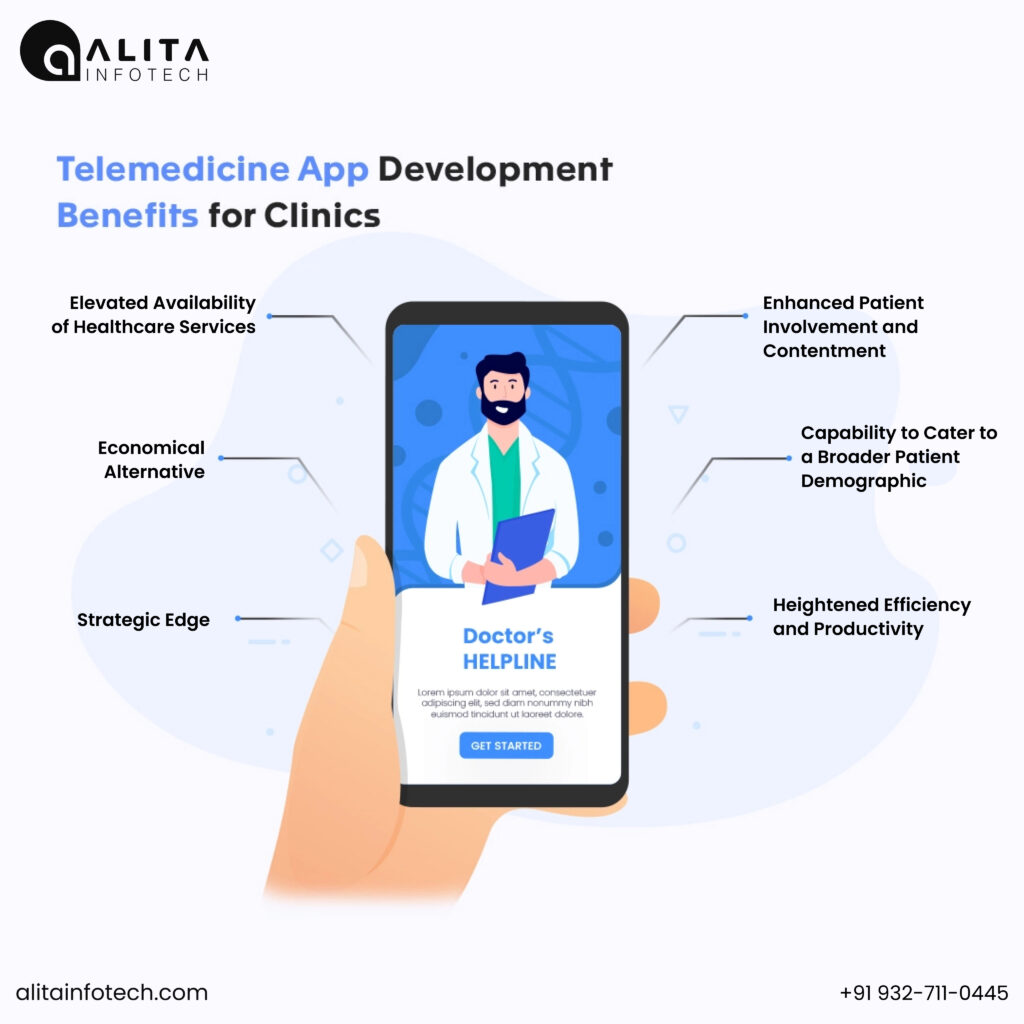Bid farewell to extended wait periods and constrained availability as on-demand consultations through telemedicine app development surge in popularity. The substantial $55.9 billion generated by the global telemedicine market in 2020 is a testament to the enduring impact of this technology.

Virtual consultations deliver equivalent levels of care within the confines of your residence, rendering medical advice, prescription renewals, and diagnoses exceptionally hassle-free. However, it’s not solely about convenience. Telemedicine app development holds the potential to enhance patient care, bolster operational efficiency, and foster a more financially viable and enduring practice.
In this piece, we will delve into the six pivotal rationales why your clinic should adopt a telemedicine app to maintain a competitive edge in the swiftly transforming healthcare landscape.

Here are six compelling justifications for why your clinic should consider integrating a telemedicine application.
Elevated Availability of Healthcare Services
Telemedicine significantly boosts the availability of healthcare services. Individuals residing in remote locations, facing mobility limitations, or confined to their homes can effortlessly seek consultations and medical guidance via telemedicine applications.
This eliminates the necessity for patients to undertake arduous journeys for doctor visits, a task that can be especially demanding for those in need of frequent medical care.
Enhanced Patient Involvement and Contentment
The integration of telemedicine applications leads to heightened patient involvement and contentment by offering a more convenient and readily accessible healthcare encounter. Patients can effortlessly arrange appointments, receive timely reminders, and engage in direct communication with their healthcare professionals through the app.
This fosters a more tailored experience and nurtures a foundation of trust between patients and their healthcare providers. Moreover, when patients have effortless access to their healthcare providers, they are more inclined to adhere to treatment plans and diligently monitor their medical conditions.
Economical Alternative
Telemedicine applications present an economical alternative for healthcare providers. By eliminating the necessity for in-person visits, clinics can lower their operational expenses linked with maintaining a physical practice. This encompasses costs like rent, utilities, and medical supplies.
Furthermore, telemedicine apps can contribute to a decrease in missed appointments and no-shows, which can be a financial burden for clinics. This renders telemedicine a financially prudent choice for practices of varying sizes.

Capability to Cater to a Broader Patient Demographic
Telemedicine applications empower clinics to extend their services to a wider patient demographic. Through virtual consultations, clinics can now assist patients residing beyond their immediate vicinity. This broadens the clinic’s scope and augments the possibilities for acquiring new patients.
Moreover, telemedicine apps serve as a valuable tool for conducting follow-up consultations. This aids clinics in sustaining patient relationships and delivering consistent, ongoing care.
Heightened Efficiency and Productivity
Telemedicine applications elevate efficiency and productivity for healthcare providers. Physicians can effortlessly retrieve patient records, lab results, and other crucial medical data via the app.
This diminishes the time allocated to administrative duties, enabling doctors to concentrate more on delivering medical care. Moreover, telemedicine apps can automate tasks like appointment scheduling and patient reminders, leading to time savings and heightened productivity.
Strategic Edge
Developing a telemedicine app can furnish your clinic with a strategic edge. Given the escalating demand for telemedicine services, possessing a dedicated app can draw in new patients and fortify relationships with existing ones.
Furthermore, telemedicine apps allow clinics to distinguish themselves from competitors that do not provide virtual consultations. This distinction is especially vital in today’s digital era, where patients are progressively turning to technology to oversee their healthcare needs.
Challenges Of Telemedicine App
Being a Healthcare Software Development Company, we grasp the substantial advantages that the surge of telemedicine has introduced to the healthcare sector. Nonetheless, we are also attuned to the hurdles that accompany the implementation of a Healthcare app solution. Below, we outline some of the challenges associated with telemedicine apps that demand our attention:
1. Integration of Technology:
The successful operation of telemedicine apps hinges on their seamless integration with diverse healthcare systems, encompassing Electronic Health Records (EHRs), medical devices, and communication platforms. Achieving compatibility and security across these systems is a multifaceted task that demands the expertise of a skilled healthcare software development team.
2. Adherence to Regulatory Standards:
Compliance with an array of regulations and standards is imperative for telemedicine apps to guarantee the safety and privacy of patients. This includes adhering to protocols such as HIPAA, GDPR, and other region-specific regulations. Partnering with a Healthcare Software Development Company well-versed in these regulations is essential to sidestep potential costly penalties and safeguard the clinic’s reputation.

3. User Acceptance:
A significant hurdle for telemedicine apps lies in achieving user acceptance. Both patients and healthcare practitioners may exhibit reluctance towards adopting new technology or might lack familiarity with it. Consequently, it is imperative to develop interfaces that are intuitive and user-friendly, alongside providing comprehensive training and support to facilitate adoption.
4. Care Quality Assurance:
While telemedicine expands accessibility and efficiency, there are concerns regarding the quality of care provided in remote consultations. Ensuring that healthcare providers have access to comprehensive and accurate patient data is paramount in guaranteeing the delivery of high-quality care.
5. Connectivity Challenges:
Telemedicine apps rely on consistent and dependable internet connections for seamless operation. Patients and healthcare professionals situated in remote or underserved areas may encounter difficulties in accessing high-speed internet, potentially limiting the effectiveness of telemedicine.
In conclusion, the challenges posed by telemedicine apps are intricate and necessitate the expertise of seasoned healthcare software developers. As a dedicated Healthcare Software Development Company, we are steadfast in our commitment to surmounting these obstacles and delivering innovative solutions that enhance healthcare accessibility for all.
To Recapitulate
For clinic proprietors, prioritizing the creation of a telemedicine app is paramount. Through collaboration with a reputable telemedicine app development company and the engagement of proficient telemedicine app developers, a tailored application can be crafted to cater to your specific requirements, ensuring a seamless patient experience.
Armed with the right telemedicine app, you can elevate the quality of care provided to your patients while concurrently reducing costs and augmenting revenue. The time to act is now – embark on the journey of exploring telemedicine app development solutions with us and propel your clinic to new heights!